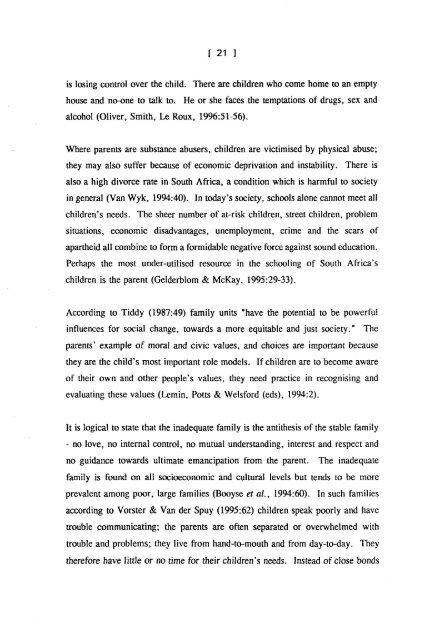parents and principals as partners in creating a culture of learning
parents and principals as partners in creating a culture of learning
parents and principals as partners in creating a culture of learning
Create successful ePaper yourself
Turn your PDF publications into a flip-book with our unique Google optimized e-Paper software.
[ 21 ]<br />
is los<strong>in</strong>g control over the child. There are children who come home to an empty<br />
house <strong>and</strong> no-one to talk to. He or she faces the temptations <strong>of</strong> drugs, sex <strong>and</strong><br />
alcohol (Oliver, Smith, Le Roux, 1996:51-56).<br />
Where <strong>parents</strong> are substance abusers, children are victimised by physical abuse;<br />
they may also suffer because <strong>of</strong> economic deprivation <strong>and</strong> <strong>in</strong>stability. There is<br />
also a high divorce rate <strong>in</strong> South Africa, a condition which is harmful to society<br />
<strong>in</strong> general (Van Wyk, 1994:40). In today's society, schools alone cannot meet all<br />
children's needs. The sheer number <strong>of</strong> at-risk children, street children, problem<br />
situations, economic disadvantages, unemployment, crime <strong>and</strong> the scars <strong>of</strong><br />
apartheid all comb<strong>in</strong>e to form a formidable negative force aga<strong>in</strong>st sound education.<br />
Perhaps the most under-utilised resource <strong>in</strong> the school<strong>in</strong>g <strong>of</strong> South Africa's<br />
children is the parent (Gelderblom & McKay, 1995:29-33).<br />
Accord<strong>in</strong>g to Tiddy (1987:49) family units "have the potential to be powerful<br />
<strong>in</strong>fluences for social change, towards a more equitable <strong>and</strong> just society." The<br />
<strong>parents</strong>' example <strong>of</strong> moral <strong>and</strong> civic values, <strong>and</strong> choices are important because<br />
they are the child's most important role models. If children are to become aware<br />
<strong>of</strong> their own <strong>and</strong> other people's values, they need practice <strong>in</strong> recognis<strong>in</strong>g <strong>and</strong><br />
evaluat<strong>in</strong>g these values (Lem<strong>in</strong>, Potts & Welsford (eds), 1994:2).<br />
It is logical to state that the <strong>in</strong>adequate family is the antithesis <strong>of</strong> the stable family<br />
- no love, no <strong>in</strong>ternal control, no mutual underst<strong>and</strong><strong>in</strong>g, <strong>in</strong>terest <strong>and</strong> respect <strong>and</strong><br />
no guidance towards ultimate emancipation from the parent. The <strong>in</strong>adequate<br />
family is found on all socioeconomic <strong>and</strong> cultural levels but tends to be more<br />
prevalent among poor, large families (Booyse et al., 1994:60). In such families<br />
accord<strong>in</strong>g to Vorster & Van der Spuy (1995:62) children speak poorly <strong>and</strong> have<br />
trouble communicat<strong>in</strong>g; the <strong>parents</strong> are <strong>of</strong>ten separated or overwhelmed with<br />
trouble <strong>and</strong> problems; they live from h<strong>and</strong>-to-mouth <strong>and</strong> from day-to-day. They<br />
therefore have little or no time for their children's needs. Instead <strong>of</strong> close bonds

















